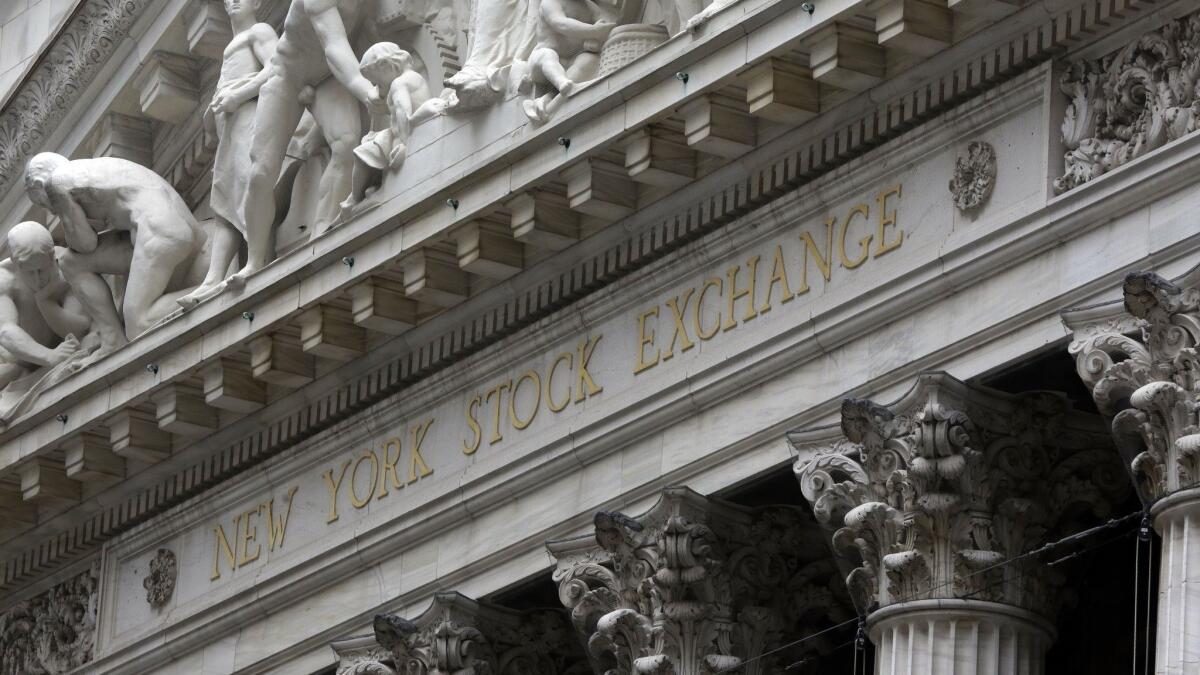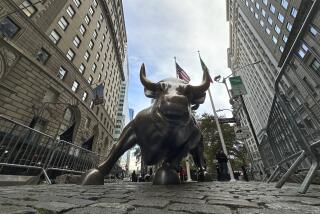Stocks falter, hurt by surprisingly weak retail sales

U.S. stock indexes clawed most of the way back from an early slide Thursday and still finished mostly down, ending a four-day winning streak for the benchmark Standard & Poor’s 500 index.
Losses by banks, retailers and consumer products makers offset gains by healthcare, technology and other companies as investors weighed new data showing that retail sales slumped in December amid a disappointing holiday shopping season.
The Commerce Department reported that December retail sales posted their biggest drop since September 2009. Separately, the National Retail Federation issued figures showing U.S. holiday-season sales were weaker than expected.
The retail sales data initially put investors in a selling mood, but the selloff reversed course as traders reconsidered how useful the 2-month-old data would be in forecasting consumer spending trends in coming months.
“This was a really big shock because it was a nine-year low, in terms of its move, but the market doesn’t care what happened two months ago,” said Randy Frederick, vice president of trading and derivatives at Charles Schwab. “The market really wants to know what’s going on today, and really more importantly what to look for the next month.”
The Dow Jones industrial average ended with a loss of 103.88 points, or 0.4%, at 25,439.39. Earlier in the day it was down 235 points.
The S&P 500 index fell 7.30 points, or 0.3%, to 2,745.73. The Nasdaq composite edged up 6.58 points, or 0.1%, to 7,426.95. The Russell 2000 index of small-company stocks edged up 2.16 points, or 0.1%, to 1,545.11.
Slightly more stocks rose than fell on the New York Stock Exchange. Major European indexes finished mostly lower.
Investors retreated into U.S. government bonds following the weak retail sales report, sending benchmark yields lower. The yield on the 10-year Treasury note fell to 2.65% from 2.70%. That yield is used to set rates on mortgages and other kinds of loans.
The Commerce Department said retail sales fell 1.2% in December from the previous month. Total retail sales for 2018 rose 5% from the previous year. Separately, the National Retail Federation, the nation’s largest retail trade group, said that holiday sales increased a lower-than-expected 2.9% as worries about the U.S.-China trade war, the partial shutdown of the federal government and stock market turmoil dampened shoppers’ spending in December.
Retailers had foreshadowed the results in the new reports earlier this month when they disclosed weak holiday-season sales.
The sales data pulled shares in Macy’s and other retailers lower. But those losses were tempered later in the day as some economists and analysts questioned whether the government shutdown and resulting delay in collecting the retail sales data had made the results an unreliable barometer of consumer spending in coming months.
Macy’s ended down 0.4%. Amazon slid 1.1%. J.C. Penney bounced back to finish with a 0.7% gain.
Consumer products makers took a beating after Coca-Cola said its sales could slow this year because of the strong dollar. Coca-Cola slumped 8.4%.
Markets had been rising this week as investors became optimistic that new talks could move the United States and China closer to a resolution of their trade fight. The talks began Monday, but key negotiators were set to meet Thursday and Friday in an attempt to avoid an escalation of tariffs that have raised prices for companies and consumers.
The nations are trying to hash out a deal before March 2, when the U.S. has said it would go ahead with penalties on an additional $200 billion of Chinese goods. President Trump reportedly has said he’s willing to let that deadline slide if talks go well.
Worries about other nations’ economies are deepening. China’s economy grew at its slowest pace in three decades last year, and Europe is contending with a slowdown in growth. Germany, with the biggest economy in Europe, recorded no growth in the fourth quarter, just barely avoiding a recession.
Several companies slumped on disappointing quarterly earnings or outlooks Thursday.
Fossil Group dropped 3.3% after reporting a global sales decline. The watchmaker cited economic weakness in several regions, along with reduced discounting and price-matching as key reasons for the weak quarter.
American International Group sank 9% after the insurer said a surge in losses from wildfires and hurricanes helped push it to a fourth-quarter loss. It also reported lower investment income in the quarter.
Casino operators broadly fell on concerns that the growth of online gambling could be stunted by a recent Department of Justice opinion. MGM Resorts Chief Executive Jim Murren, on a call with investors, decried the Justice Department’s opinion for a broader restriction on interstate gambling. The industry is looking to online gambling and sports betting as key drivers of growth. MGM fell 6.4%, Wynn Resorts slid 2.7%, and Las Vegas Sands fell 1.7%.
Cisco Systems had a better day. The maker of networking equipment rose 1.9% after it announced a big stock buyback and reported solid demand in its latest quarter.
U.S. benchmark crude rose 0.9% to settle at $54.41 a barrel in New York. Brent crude, the standard for international oil prices, climbed 1.5% to $64.57 a barrel in London.
The dollar weakened to 110.49 yen from 110.99 yen. The euro strengthened to $1.1301 from $1.1271.
Gold slipped 0.1% to $1,313.90 an ounce. Silver fell 0.8% to $15.53 an ounce. Copper was little changed at $2.77 a pound.
In other energy futures trading, wholesale gasoline climbed 3% to $1.51 a gallon. Heating oil rose 1.7% to $1.97 a gallon. Natural gas slipped 0.1% to $2.57 per 1,000 cubic feet.
More to Read
Inside the business of entertainment
The Wide Shot brings you news, analysis and insights on everything from streaming wars to production — and what it all means for the future.
You may occasionally receive promotional content from the Los Angeles Times.










